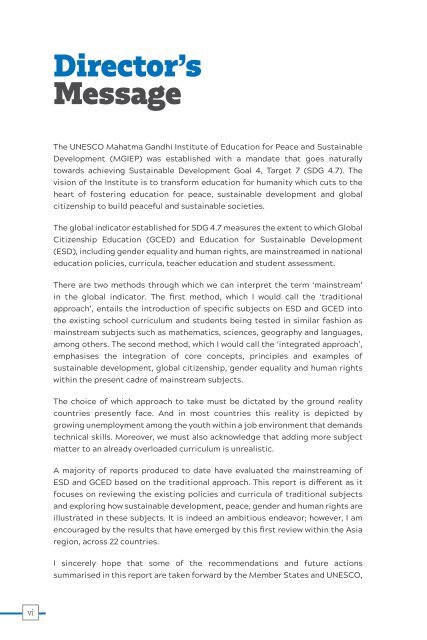Rethinking Schooling for the 21st Century
UNESCO MGIEP officially launched 'Rethinking Schooling for the 21st Century: The State of Education, Peace and Sustainable Development and Global Citizenship' in 2017 at the UNESCO General Conference. This study analyses how far the ideals of SDG 4.7 are embodied in policies and curricula across 22 Asian countries and establishes benchmarks against which future progress can be assessed. It also argues forcefully that we must redefine the purposes of schooling, addressing the fundamental challenges to efforts to promote peace, sustainability and global citizenship through education.
UNESCO MGIEP officially launched 'Rethinking Schooling for the 21st Century: The State of Education, Peace and Sustainable Development and Global Citizenship' in 2017 at the UNESCO General Conference. This study analyses how far the ideals of SDG 4.7 are embodied in policies and curricula across 22 Asian countries and establishes benchmarks against which future progress can be assessed. It also argues forcefully that we must redefine the purposes of schooling, addressing the fundamental challenges to efforts to promote peace, sustainability and global citizenship through education.
Create successful ePaper yourself
Turn your PDF publications into a flip-book with our unique Google optimized e-Paper software.
Director’s<br />
Message<br />
The UNESCO Mahatma Gandhi Institute of Education <strong>for</strong> Peace and Sustainable<br />
Development (MGIEP) was established with a mandate that goes naturally<br />
towards achieving Sustainable Development Goal 4, Target 7 (SDG 4.7). The<br />
vision of <strong>the</strong> Institute is to trans<strong>for</strong>m education <strong>for</strong> humanity which cuts to <strong>the</strong><br />
heart of fostering education <strong>for</strong> peace, sustainable development and global<br />
citizenship to build peaceful and sustainable societies.<br />
The global indicator established <strong>for</strong> SDG 4.7 measures <strong>the</strong> extent to which Global<br />
Citizenship Education (GCED) and Education <strong>for</strong> Sustainable Development<br />
(ESD), including gender equality and human rights, are mainstreamed in national<br />
education policies, curricula, teacher education and student assessment.<br />
There are two methods through which we can interpret <strong>the</strong> term ‘mainstream’<br />
in <strong>the</strong> global indicator. The first method, which I would call <strong>the</strong> ‘traditional<br />
approach’, entails <strong>the</strong> introduction of specific subjects on ESD and GCED into<br />
<strong>the</strong> existing school curriculum and students being tested in similar fashion as<br />
mainstream subjects such as ma<strong>the</strong>matics, sciences, geography and languages,<br />
among o<strong>the</strong>rs. The second method, which I would call <strong>the</strong> ‘integrated approach’,<br />
emphasises <strong>the</strong> integration of core concepts, principles and examples of<br />
sustainable development, global citizenship, gender equality and human rights<br />
within <strong>the</strong> present cadre of mainstream subjects.<br />
The choice of which approach to take must be dictated by <strong>the</strong> ground reality<br />
countries presently face. And in most countries this reality is depicted by<br />
growing unemployment among <strong>the</strong> youth within a job environment that demands<br />
technical skills. Moreover, we must also acknowledge that adding more subject<br />
matter to an already overloaded curriculum is unrealistic.<br />
A majority of reports produced to date have evaluated <strong>the</strong> mainstreaming of<br />
ESD and GCED based on <strong>the</strong> traditional approach. This report is different as it<br />
focuses on reviewing <strong>the</strong> existing policies and curricula of traditional subjects<br />
and exploring how sustainable development, peace, gender and human rights are<br />
illustrated in <strong>the</strong>se subjects. It is indeed an ambitious endeavor; however, I am<br />
encouraged by <strong>the</strong> results that have emerged by this first review within <strong>the</strong> Asia<br />
region, across 22 countries.<br />
I sincerely hope that some of <strong>the</strong> recommendations and future actions<br />
summarised in this report are taken <strong>for</strong>ward by <strong>the</strong> Member States and UNESCO,<br />
vi

















